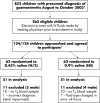Isotonic is better than hypotonic saline for intravenous rehydration of children with gastroenteritis: a prospective randomised study
- PMID: 16352625
- PMCID: PMC2065928
- DOI: 10.1136/adc.2005.084103
Isotonic is better than hypotonic saline for intravenous rehydration of children with gastroenteritis: a prospective randomised study
Abstract
Aims: To determine whether the risk of hyponatraemia in children with gastroenteritis receiving intravenous (IV) fluids is decreased by the use of 0.9% saline.
Methods: A prospective randomised study was carried out in a tertiary paediatric hospital. A total of 102 children with gastroenteritis were randomised to receive either 0.9% saline + 2.5% dextrose (NS) or 0.45% saline + 2.5% dextrose (N/2) at a rate determined by their treating physician according to hospital guidelines and clinical judgement. Plasma electrolytes, osmolality, and plasma glucose were measured before (T(0)) and 4 hours after (T(4)) starting IV fluids, and subsequently if clinically indicated. Electrolytes and osmolality were measured in urine samples. Results were analysed according to whether children were hyponatraemic (plasma sodium <135 mmol/l) or normonatraemic at T(0).
Results: At T(0), mean (SD) plasma sodium was 135 (3.3) mmol/l (range 124-142), with 37/102 (36%) hyponatraemic. At T(4), mean plasma sodium in children receiving N/2 remained unchanged in those initially hyponatraemic (n = 16), but fell 2.3 (2.2) mmol/l in the normonatraemic group. In contrast, among children receiving NS, mean plasma sodium was 2.4 (2.0) mmol/l higher in those hyponatraemic at baseline (n = 21) and unchanged in the initially normonatraemic children. In 16 children who were still receiving IV fluids at 24 hours, 3/8 receiving N/2 were hyponatraemic compared with 0/8 receiving NS. No child became hypernatraemic.
Conclusions: In gastroenteritis treated with intravenous fluids, normal saline is preferable to hypotonic saline because it protects against hyponatraemia without causing hypernatraemia.
Conflict of interest statement
Competing interests: none declared
Comment in
-
Adverse effects of rapid isotonic saline infusion.Arch Dis Child. 2006 Sep;91(9):797. doi: 10.1136/adc.2006.100123. Arch Dis Child. 2006. PMID: 16923868 Free PMC article. No abstract available.
References
-
- Duke T, Molyneux E M. Intravenous fluids for seriously ill children: time to reconsider. Lancet 20033621320–1323. - PubMed
-
- Moritz M L, Ayus J C. Prevention of hospital‐acquired hyponatremia: a case for using isotonic saline. Pediatrics 2003111227–230. - PubMed
-
- Anon Practice parameter: The management of acute gastroenteritis in young children. American Academy of Pediatrics, Provisional Committee on Quality Improvement, Subcommittee on Acute Gastroenteritis. Pediatrics 199697424–435. - PubMed
Publication types
MeSH terms
Substances
LinkOut - more resources
Full Text Sources
Medical
Miscellaneous


